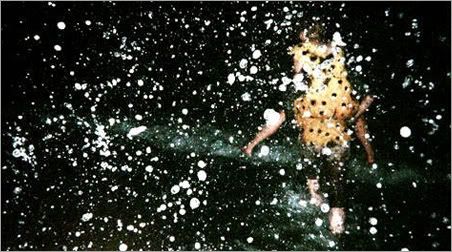
“Clawing Out at the Walls”
from the EP Young at Love and Life
2010
iTunes
As the driving forces of our economic and societal spheres witness a turnover in demographic configuration, recent treatises examining the tendencies of Generation Y have pinpointed a delayed entry into, as it were, real life. Consigning social institutions such as the workforce, marriage, and procreation to the back burner has become normal procedure for an overwhelming percentage of twenty-somethings. Of course, the decisions that have occasioned this fluctuation aren’t necessarily voluntary. A casual flip through any news magazine will disclose the more obvious factors contributing to this overhaul: the seemingly insurmountable restraints of an unstable economy, the drought of available employment as outsourcing becomes more of a corporate matter of course, the increased emphasis of postgraduate education when a bachelor’s degree was once deemed a distinguishing qualification, and so on.
The old joke goes that most pessimists identify themselves as realists, and, what with the bummer of these external circumstances, I’m wondering if everybody who has come of age within the sociopolitical climate so abruptly established on September 11 would reckon himself or herself a “realist.” Hailing from San Francisco, the local economy and general goings-on of which are of value to a state government that was on the verge of declaring bankruptcy last year, Dominant Legs broaches these current shifts with their debut EP, Young at Love and Life. Such cheerless themes aren’t touched upon in so many words, but these four initiatory songs from Ryan Lynch (who also plays a role in the band Girls and was partially responsible for last year’s drolly titled Album) and Hannah Hunt attempt to reconcile the callow idealism of adolescence with the reality of maturation. Aside from the increasing responsibilities that adulthood demands of us, Young at Love and Life considers how abstract concepts like, well, love and “life” become much messier and less straightforward, more multiplex than they ever existed in our rosy aspirations.
The loss of innocence has always served as a potent motif across both time and artistic mediums. Whether Harper Lee is attempting to make sense of glaring racism through the eyes of Scout Finch or Noah Baumbach is internalizing the aftermath of a broken family in The Squid and the Whale, the Bildungsroman speaks to its audience with its depiction of coming-of-age through familiar experiences. Young at Love and Life is the epilogue of those experiences. While recalling the uncluttered logistics of earlier, halcyon days, the songs jadedly zero in on the complications of growing up.
Of particular interest is the sunny facade against which all of this reflection is conducted: Young at Love and Life is all pop. Yeah, Lynch begins the title track by addressing the girl of his dreams, chirruping, “I was feeling something good / As soon as you arrived,” only to recall, “Well, we grew up and now/ You’re gone away somehow,” but the drums still sound like plastic and the guitar rolls out a disco lick slightly similar to Twin Sister’s “All Around and Away We Go.” The other three songs are just as catchy, what with glossy guitars, loopy synthesizers, jubilant horns, and handclaps. Traces of surf rock add a depth to the contradiction between the upbeat character of the music and the unpleasant focus of Lynch’s songwriting.
The chirpy background vocals of Hunt work in the same way to keep it interesting, not because her voice or style is especially impressive, but because Dominant Legs reroutes the charisma of past and present boy-girl duos. Rather than act out that enduringly enchanting paradigm of pop music, the two manipulate the archetype through the pathos of their subject matter. While our longstanding enthrallment with the traditional boy-girl duo was always won through immediate, seductive charm, Dominant Legs allures without being too cutesy. Certain formative experiences have obviously instilled a worldliness that disallows the coy playfulness of Nancy Sinatra or the coquettish mien that Zooey Deschanel has made a career out of. But the music is animated enough so that Lynch doesn’t come across as a grizzled Lee Hazlewood, too.
Thematically, this EP is more rueful than tragic: it doesn’t seep the bleakness and candor of Girls that stupefied and unnerved critics last year, but the regret here is representative enough to keep me listening. Fixed against the bright, sing-along melodies, Young at Love and Life is an auspicious start for Dominant Legs, and conceivably, unlike most things nowadays, the best is yet to come.


